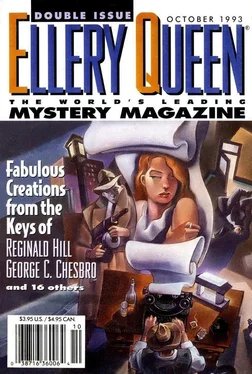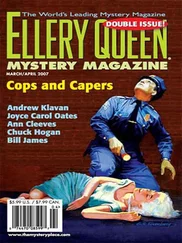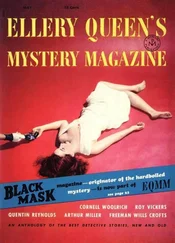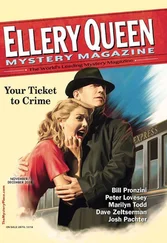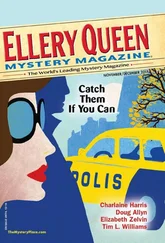Charles Ardai - Ellery Queen’s Mystery Magazine. Vol. 102, No. 4 & 5. Whole No. 618 & 619, October 1993
Здесь есть возможность читать онлайн «Charles Ardai - Ellery Queen’s Mystery Magazine. Vol. 102, No. 4 & 5. Whole No. 618 & 619, October 1993» весь текст электронной книги совершенно бесплатно (целиком полную версию без сокращений). В некоторых случаях можно слушать аудио, скачать через торрент в формате fb2 и присутствует краткое содержание. Город: New York, Год выпуска: 1993, Издательство: Davis Publications, Жанр: Детектив, на английском языке. Описание произведения, (предисловие) а так же отзывы посетителей доступны на портале библиотеки ЛибКат.
- Название:Ellery Queen’s Mystery Magazine. Vol. 102, No. 4 & 5. Whole No. 618 & 619, October 1993
- Автор:
- Издательство:Davis Publications
- Жанр:
- Год:1993
- Город:New York
- ISBN:нет данных
- Рейтинг книги:3 / 5. Голосов: 1
-
Избранное:Добавить в избранное
- Отзывы:
-
Ваша оценка:
- 60
- 1
- 2
- 3
- 4
- 5
Ellery Queen’s Mystery Magazine. Vol. 102, No. 4 & 5. Whole No. 618 & 619, October 1993: краткое содержание, описание и аннотация
Предлагаем к чтению аннотацию, описание, краткое содержание или предисловие (зависит от того, что написал сам автор книги «Ellery Queen’s Mystery Magazine. Vol. 102, No. 4 & 5. Whole No. 618 & 619, October 1993»). Если вы не нашли необходимую информацию о книге — напишите в комментариях, мы постараемся отыскать её.
Ellery Queen’s Mystery Magazine. Vol. 102, No. 4 & 5. Whole No. 618 & 619, October 1993 — читать онлайн бесплатно полную книгу (весь текст) целиком
Ниже представлен текст книги, разбитый по страницам. Система сохранения места последней прочитанной страницы, позволяет с удобством читать онлайн бесплатно книгу «Ellery Queen’s Mystery Magazine. Vol. 102, No. 4 & 5. Whole No. 618 & 619, October 1993», без необходимости каждый раз заново искать на чём Вы остановились. Поставьте закладку, и сможете в любой момент перейти на страницу, на которой закончили чтение.
Интервал:
Закладка:
“You see the evidence,” the blond said. “You see the pictures.”
“I see pictures. Anyone can take pictures.”
The black man stopped drumming his fingers. “Not anyone could have taken those pictures. They haven’t found Monterrez yet.”
“So you found him. That doesn’t mean you killed him.”
“We killed him,” the blond said.
“So you say.”
The third man rose slightly from his chair, in answer to the insult, but the blond made a motion to him and he sat down again.
The blond said, “Mr...?”
“No names,” the man in the mask said.
“Mr. No Names,” the blond said. “What proof do you want?”
The man in the mask collected the four black-and-white photographs that lay on the desk and held them out to the men. The blond took them and slipped them into his pocket.
“There is a job I know for sure was performed by the Jomon. The name was—” The man looked down at a pad of notes. “Madradas. Lienore and Maria Madradas. Bring me photos of their bodies. If you are the Jomon.”
“And if you are the police?”
“I am not.”
“And if you are...?” the blond said.
“If I am the police, then there are officers already outside the door who will arrest you as you try to leave. You know this is not the case. Waste no more of my time with your games and your pitiful impersonation. The Jomon are not game players. If they knew you were using their name they would leave you dead in a gutter this very night.”
The blond’s knuckles whitened as he clenched the arm of the chair tighter. The black man’s fingers drummed on and on.
“Leave now,” said the man in the mask. “And bring me proof if you can.”
The blond stood up and the others followed. They walked to the door and opened it. There were no officers waiting for them.
With the door open, the tumult from the street was even louder. Then the door was closed, the noise was deadened, and the three men were gone.
Ramon Madradas was a tired-looking man, and had been even when he was young and active. At age forty-three, having lived through war, marriage, the birth of two daughters, and the death of one, he had finally grown into his features. His eyelids hung. His cheeks drooped. The lines in his forehead turned down at either end. Though he smiled easily and often, it was a weary smile. And though he stood straight, it was a weary stance: one hip higher than the other, all his weight resting on one leg as though he barely had the strength or interest to hold himself upright.
His wife, Lienore, was taller than he was, and so was his daughter, Maria. In family photographs, he usually stood between them. In some, they looked at each other and smiled over the top of his head.
Lienore was heavyset and broad-shouldered, with features typical of Brazilian women, particularly those born in the north, near Venezuela. She had straight black hair and brown skin, pink fingers, wide eyes. Ramon had the stiff, thick hair of the country-born and the map of minor scars, all along his arms and on his face, that was the property of most men who did not spend their youth in the academy.
Maria showed the advantages of a girl brought up in the city, on good food and clean water. She had her mother’s eyes and hair, but the hair she wore long, down to her waist, and the eyes, when outlined and daubed with shadow, looked almost exotic. She was thin and well proportioned, long of leg and neck and forehead. She almost looked like a heavily tanned North American woman, and once or twice on the beach had in fact been mistaken for one. She had allowed the misconception to take hold and had said nothing to dispel it, not from shame, or at least not entirely, but out of pleasure at being able to cross from one world to the other. Her mother received looks from these men, of contempt and dismissal, that were entirely different from the looks Maria received. When she walked alone on the beach, Maria called herself Maria Stone.
Ramon knew of this and accepted it as inevitable. He had himself left the countryside for the city, had moved from a shanty to an apartment over a store he meant ultimately to own, and had, out of shame and a desire to re-create himself as a cosmopolitan and a success, never recontacted his family. He had been seventeen, as Maria was now. So he understood her impulse and accepted, as a father’s burden, his sorrow.
He had finally bought the store during a drought, when it had seemed that the tourists, too, and not only the rain, had dried up for good. The old man he had worked for had taken sick and then died and his son, who inherited, had wanted nothing to do with the store. He sold it to Ramon for the contents of Ramon’s meager savings account, which left Ramon and Lienore unable to buy a new bed to replace the broken one in which they slept and in possession of a bodega whose stock was stale and whose clientele was currently vacationing elsewhere, in less punishing climates.
But then the drought had ended and the big coastal hotels had gone up, and one evening in a cruelly hot August, infant Maria had come screaming into the world. The store had supported them. A new bed was bought. Ramon bought himself a Jeep and a carved headstone for the grave of Melita, who had suffocated at eleven months in her crib. Lienore had a pair of nice dresses that she almost never took out of their plastic sheaths; Maria had bikinis to wear, and to take off, in front of the boys who stayed at the hotels.
And the day came when, walking in the street, Ramon passed Maria and a tall Caucasian fellow walking arm in arm and Maria blushed, turned her eyes away from him, and steered the young man in another direction so that their paths would not cross. Ramon took this, in an awful way, as fulfillment of all his ambitions. That he could raise a daughter so much better than he was that she could feel embarrassed at the sight of him! How far the Madradas name had advanced in the world! He cried that night when he told Lienore, but he was not entirely unhappy.
For a dozen years, and more than a dozen, the store prospered, and the Madradas fortune, though still meager, grew. Ramon paid visits to the owner of the building next to his, where a steakhouse with outdoor tables did brisk business every night of the week. Discussions began, papers were signed, hands shaken. And now Ramon, who owned a bodega and a steakhouse, felt his eyes start to wander toward the cantina across the street.
But the drought returned, as droughts will, and hotels with huge, always-full pools notwithstanding, the flow of Norte-Americanos slowed to a trickle, and then to less than a trickle — a drip, really.
Ramon took down the outdoor tables — who now wanted to sit outdoors? — and installed a pair of ceiling fans. He put signs up in the windows of the bodega advertising special sales, on suntan oil and postcards and paper fans, and then took the signs down when it became clear that they brought no one in. He had a half interest in the cantina by this time, and people did still come in to drink, but the balance shifted and what had once only pretended to be a rough bar for the benefit of tourists became the genuine article, peopled with out-of-work natives and angry hotel workers laid off by their belt-tightening employers. Ramon cut his steak order in half, and then in half again, and finally switched to grilled hamburgers instead. He closed the bodega for longer siestas every afternoon. Some days he didn’t open at all.
Then a day came when the bills started to arrive three at a time and the money he kept in the bank, no longer as savings but as a buffer against catastrophe, was gone, down to the last cruzeiro. Sales at the bodega were stagnant. Ramon’s suppliers refused to come to restock the shelves. Pescador Street was half-deserted, storefronts empty after having been abandoned by their discouraged owners. Having lived through a drought before, Ramon was determined to see this one through as well. But in the end he arrived reluctantly at the conclusion that without additional money from some source — any source — there was no way that he could.
Читать дальшеИнтервал:
Закладка:
Похожие книги на «Ellery Queen’s Mystery Magazine. Vol. 102, No. 4 & 5. Whole No. 618 & 619, October 1993»
Представляем Вашему вниманию похожие книги на «Ellery Queen’s Mystery Magazine. Vol. 102, No. 4 & 5. Whole No. 618 & 619, October 1993» списком для выбора. Мы отобрали схожую по названию и смыслу литературу в надежде предоставить читателям больше вариантов отыскать новые, интересные, ещё непрочитанные произведения.
Обсуждение, отзывы о книге «Ellery Queen’s Mystery Magazine. Vol. 102, No. 4 & 5. Whole No. 618 & 619, October 1993» и просто собственные мнения читателей. Оставьте ваши комментарии, напишите, что Вы думаете о произведении, его смысле или главных героях. Укажите что конкретно понравилось, а что нет, и почему Вы так считаете.
